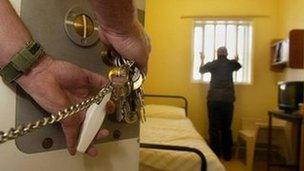76% rise in number of people jailed for not paying fines in NI
- Published

CJINI said it was "inappropriate and expensive" to jail people who failed to pay fines
The number of people jailed for not paying fines has risen by 76% over two years, despite a 2010 report calling for the practice to be minimised.
Criminal Justice Inspection Northern Ireland said the number imprisoned for defaulting on court orders increased from 1,237 in 2009 to 2,179 last year.
It added that of the 10 recommendations it made in its 2010 report, two were not implemented and five partially.
Justice Minister David Ford said he accepted more needed to be done.
In its follow-up review into the issue, Criminal Justice Inspection Northern Ireland (CJINI) said it was repeating the call it made in March 2010 for justice agencies to reduce "the inappropriate and expensive use of police and prison resources" in fine default cases.
Acting Chief Inspector Brendan McGuigan said CJINI's initial report had found "a need for substantial change to the enforcement process and a stricter regime for the payment of fines to maximise compliance and minimise recourse to police enforcement and imprisonment".
'Tremendous pressure'
"While we acknowledge that work that has been undertaken by the justice agencies, and particular the Northern Ireland Courts and Tribunals Service, the statistics relating to the number of warrants issued to police, the number of outstanding warrants and the number of fine defaulters being committed to prison remains significant," he said.
"There have not been the substantive changes required to the enforcement process, nor has there been a stricter regime introduced to maximise compliance and minimise police enforcement and the use of imprisonment.
"This places tremendous pressures on the prison service at a time when it is undergoing a significant change programme."
The follow-up review found the Northern Ireland Courts and Tribunals Service (NICTS) had made a significant reduction in the number of warrants issued to the police.
Pilot scheme
Mr Ford said he would be introducing to the assembly "proposals to create a civilian enforcement system, with a range of measures to tackle fine default and powers to take deductions direct from income to clear a fine".
He said he planned to extend supervised activity orders, a community service-based alternative to going to prison for non-payment which has been running as a pilot scheme in Newry.
"This report identifies the complexity surrounding the enforcement of fines and the scale of the challenge in addressing the situation," he said.
"It is because of this complexity that the justice system must develop a new approach to deal with fine defaulters rather than the old practice of sending people to prison for a few days at a time."
Mr McGuigan said CJINI welcomed the Department of Justice's strategic approach, but added that it would "require legislative change, a new civilian enforcement agency to be constructed, and new processes to be developed".
"Work needs to be urgently taken forward to introduce the stricter regime, as envisaged in the original inspection report, which will produce a system of enforcement which addresses the current issues of public confidence in the justice system, the social and financial cost of short-term sentences for fine defaulters, and the operational impact on the NICTS, the PSNI and in the Northern Ireland prisons."
- Published3 February 2012
- Published21 December 2011
- Published16 December 2011
- Published24 October 2011
- Published21 July 2011